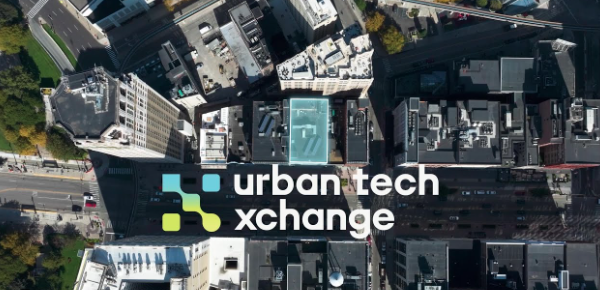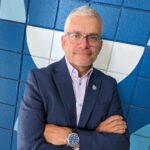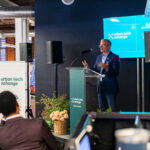
- Kim Kisner
- Business
- 04/02/2024
Innovation and Technologies for the Built Environment

Nearly six months ago the Urban Tech Xchange (UTX) launched in Detroit – an innovative lab hosting a series of startups to advance smart city technologies.
UTX is a collaboration between Bedrock, Bosch, Cisco, and KODE Labs and is operated by NextEnergy. The space provides a real-world test facility for the progression of sustainable urban solutions.
Kevin Mull, senior director for the Office of Urban Strategy and Innovation at Bedrock, sat down with SBN Detroit to discuss the work being done there.

Q: Impetus behind UTX?
A: In 2021 Bedrock worked with Bosch, Ford, and the Michigan Economic Development Corp. (MEDC) to launch the Detroit Smart Parking Lab (DSPL) at our Assembly Parking Garage. This lab was specifically designed to accommodate open innovation, allowing startups to quickly and effectively deploy early-stage mobility technologies in a real-world testing environment.
The concept has worked so well that we began to think about what’s next… being Detroit’s largest real estate developer, it made sense to try to apply those same methods to developing and deploying technologies for the built environment.
The DSPL’s focus is mobility and transportation, which in many ways is dependent upon infrastructure, so the Urban Tech Xchange (UTX) was its natural progression.
Q: In what ways does UTX help to foster a more resilient Southeast Michigan?
A: I think it brings attention to the region’s entrepreneurial spirit and helps define Detroit as a place for innovation while adding another layer to its creator ecosystem.
It also gives us a chance to further collaborate with stakeholders here in Southeast Michigan. Between the DSPL, TechTown, Michigan Central, Centrepolis Accelerator, and others like those, and our universities and colleges, and now UTX, we have an emerging set of platforms for continuing to attract and cultivate new ideas and advance open innovation throughout the state.
Q: Why the combination of Bosch, Cisco, Bedrock and KODE Labs?
A: Bosch and Bedrock are natural cofounders as they have complementary business concepts. Bosch is a lead innovator in energy and building management, while Bedrock is a city builder whose development projects throughout the central business district range from residential and commercial development to hospitality and retail.
Cisco is a globally recognized brand and a huge player in smart infrastructure deployment, while KODE Labs is uniquely positioned as a Detroit-based startup focused on smart building technology that has recently experienced tremendous growth. The four companies together bring all the expertise for supporting a sustainable innovation platform, and importantly, maintain a strong Detroit presence.
Q: How will Bedrock data be used to design sustainable solutions?
A: This is the first-in-the-world kind of opportunity that’s driven by the uniquely dense portfolio we have in Detroit. We have this construct we are working on called a data lake, which is the aggregation of the data that comes from Bedrock’s 17 million square feet of real estate across Detroit.
Its access to this unique operational data, combined with publicly accessible information like that from Census Data and the U.S. Energy Information Administration, provides lab participants with the unique opportunity to tie into a broad real estate ecosystem.
We encourage and want anyone who engages with UTX to integrate their data as well, and under the right governance, we can offer this data lake to third-party developers for innovation.

Q: In what ways are energy usage and decarbonization being looked at?
A: Technologies like those being tested and deployed through the UTX platform allow us to track energy usage in real-time and better understand asset optimization. This provides us with the ability to cut back quickly and efficiently on carbon intensity.
For example, heat pumps are a great technology but in certain situations, traditional heating systems might actually create less carbon. Real-world and real-time testing will help reveal this.
The more data we get, the better decision-making we have and that can support AI applications as well. So first, it’s about understanding where a building is using energy, then understanding how the building responds to energy usage profiles.
Q: Elaborate on how UTX is forming best practices for ensuring equity in urban tech solutions.
A: When we set out to develop UTX we engaged several stakeholders such as community organizations, local government, public schools, and other platforms to all weigh in. Our work is fully transparent and there is a lot of communication in terms of where we are applying the technologies.
For example, we are currently deploying tech in an area of Detroit to better understand air and noise pollution. We are working side-by-side with the community to make sure businesses and residents understand where we are doing this, how we are doing it, and in what ways the information will be used. Communication is paramount when trying to achieve equity in tech deployment.
Q: In what ways does all of this work being done here impact businesses in Southeast Michigan?
A: I look at it as a bidirectional flow.
By establishing the UTX platform, we are helping to attract the best and brightest to deploy their innovations locally.
Conversely, established local businesses have the opportunity to plug into a platform that provides a potential global spotlight.
Q: What are some examples of new technology that’s being developed there?
A: There are several examples of building automation systems, such as using smart blinds that automatically adjust to provide maximum natural sunlight based on occupancy and interior temperature.
What I find very interesting are new systems for tracking and automating accessibility. One such deployment is smart communication between power wheelchairs and elevators. … The elevator is automatically called when the wheelchair arrives!
Q: Do you think UTX is a differentiator for Detroit?
A: Yes.
Again, it puts Detroit on the map as a place that’s committed to, and capable of driving innovations and setting benchmarks and best practices for sustainable urban solutions.
UTX is putting a stake in the ground for sustainable tech in an urban environment. Detroit is where the innovation is happening.
Be sure to subscribe to our newsletter for regular updates on sustainable business practices in and around Detroit.
Kim Kisner
- All
- Business
- Community
- Education
- Events

Unique Monique Scented Candles, a Detroit-based business founded by Monique Bounds., aims to produce candles and household products with clean ingredients and local supply chains. What began as a personal hobby during college has evolved into a full-time venture producing coconut oil and soy-based candles made with essential oils and locally sourced materials. SBN Detroit interviewed Bounds about launching a sustainable product line, sourcing challenges in Michigan, and...

Eastern Market Partnership, in collaboration with the City of Detroit’s Office of Sustainability Urban Agriculture Division, has announced $240,000 in grant funding to support Detroit-based farmers and farmer collectives. The grants will advance food access, climate education, sustainable land use, and economic opportunity, with priority given to Black- and Indigenous-led farms, youth-led initiatives, and projects rooted in historically disinvested neighborhoods. The recipients – ranging from cooperatives and community...

Citizen Robotics is a Detroit-based nonprofit that advances the use of robotics and digital manufacturing in residential construction, focusing on improving productivity, sustainability, and long-term affordability. Best known for its early work in 3D-printed housing, it explores how alternative construction methods and new financial models can reduce material waste, lower lifetime operating costs, and enhance the resilience of homes. SBN Detroit interviewed Tom Woodman, founder and president of...







